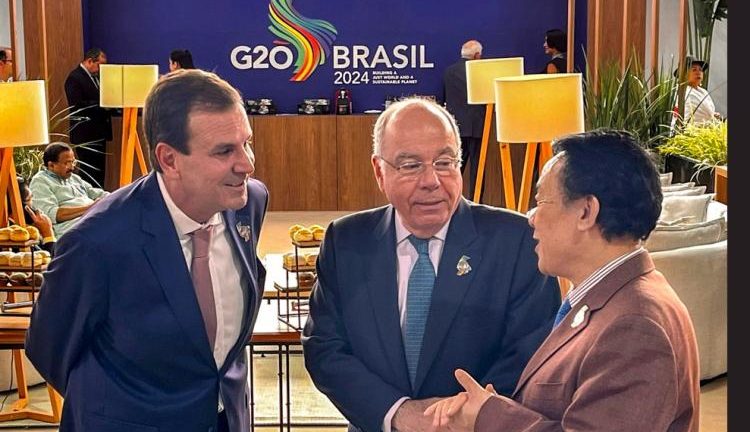By Jaya Ramachandran
RIO DE JANEIRO | 23 February 2024 (IDN) — The Director-General of the Food and Agriculture Organization of the United Nations (FAO), Mr. QU Dongyu, has called for peace, recognition of the right to food, and reform of multilateral institutions as cardinal imperatives.
Addressing the first session of the G20 Foreign Affairs Ministers Meeting on 21 February in Brazil, Qu stressed the need to prioritize “actions that promote food security globally to achieve the Four Betters: better production, better nutrition, a better environment, and a better life, leaving no one behind”.
“We need a global governance system that is fit for purpose, works in an efficient, effective, and coherent manner, is accountable to its members, and fully aligned and committed to achieve all the SDGs,” he said at the second session. “When it comes to hunger and poverty, it must prioritize people while also protecting the planet. Agrifood systems are solutions based on science and data.”
G20 represents two-thirds of the world’s population
The G20 comprises 19 countries (Argentina, Australia, Brazil, Canada, China, France, Germany, India, Indonesia, Italy, Japan, Korea, Mexico, Saudi Arabia, South Africa, Russia, Türkiye, UK, and USA) and two regional bodies: the African Union and the European Union. The members of the G20 represent around 85 per cent of the world’s GDP, more than 75 per cent of world trade and around two-thirds of the world’s population.
Participants in the G20 external affairs meeting were, in addition to the FAO Director-General, the heads of other international organizations, including the International Monetary Fund, the World Bank, the World Health Organization, and the World Trade Organization, as well as UNESCO, UNCTAD, the ILO, and numerous regional development banks.
The meeting was the first major event of Brazil’s 2024 G20 presidency, which features hunger, sustainable development and global governance as the key priorities. President Lula da Silva of Brazil has also set up a task force to establish a Global Alliance Against Hunger and Poverty by the end of the year and open to all countries, not just G20 members.
Rising food and energy prices in the wake of the COVID-19 pandemic, natural disasters, as well as ongoing conflicts and wars and asymmetrical fiscal and monetary strains, have impacted food security beyond traditional hunger hotspots.
Qu emphasized the importance of “increased investment to transform global agrifood systems to be more efficient, more inclusive, more resilient and more sustainable”, noting that it will be critical to reduce hunger and bring people out of poverty as well as assure healthy and nutritious foods for all.
Three main pathways
He pointed to three main pathways by which FAO supports and complements the efforts of the broader UN system: tackling acute hunger; bolstering efficient agricultural markets; and increasing the resilience of all Members and their populations.
The food security work entails a range of activities ranging from FAO’s hosting of the Integrated Food Security Classification (IPC) global support unit, which maps emerging hunger crises around the world, to taking an active role in fostering the goals of the Black Sea Grain Initiative, which aimed to mitigate conflict’s impact on large global trade flows.
The markets work is geared to increasing production and price information and transparency and includes hosting the Agricultural Market Information System (AMIS), established by the G20 in 2011. It played an important role in preventing excessive market volatility during the COVID-19 pandemic.
FAO’s work in increasing Members’ resilience to allow their communities to prevent and cope with crisis and shock is geared to the most vulnerable people, including women, youth, Indigenous Peoples and rural farmers. “We need to create opportunities for the poor to increase their incomes and improve their livelihoods,” Qu said, adding that digitalization and innovation as well infrastructure and better education and health services are all priority investment areas.
The Director-General offered FAO’s full support of UN Secretary-General António Guterres’s call to overhaul and renew global governance institutions in line with “21st century economic and political realities”.
FAO, working as a professional facilitator serving 194 Members, is at the centre of a global governance architecture for food security, engaging the International Fund for Agricultural Development (IFAD), the World Food Programme (WFP), the WHO and the WTO along with a partnership of 60 years with the World Bank and other international financial organizations and multilateral development institutions. The Director-General highlighted that FAO offers a unique platform for governments, academic institutions, civil society, the private sector and other key partners for exchange of knowledge and dialogues
Qu pointed to the Global Roadmap for Achieving SDG2 without breaching the 1.5C threshold, which FAO launched at the COP 28 climate summit in Dubai, United Arab Emirates, from 30 November until 12 December 2023. That roadmap can act as a catalyst to guide financing for accelerated climate actions to transform agrifood systems and help transformed agrifood systems achieve “good and nutritious food for all today and tomorrow,” he said. [IDN-InDepthNews]
Photo: From left: Eduardo Paes, Mayor of Rio de Janeiro; Mauro Vieira, Brazil’s Minister of Foreign Affairs; FAO Director’General QU Dongyu.
IDN is the flagship agency of the Non-profit International Press Syndicate.


